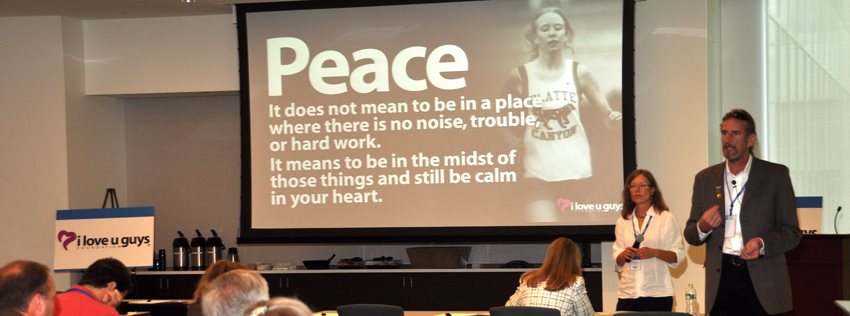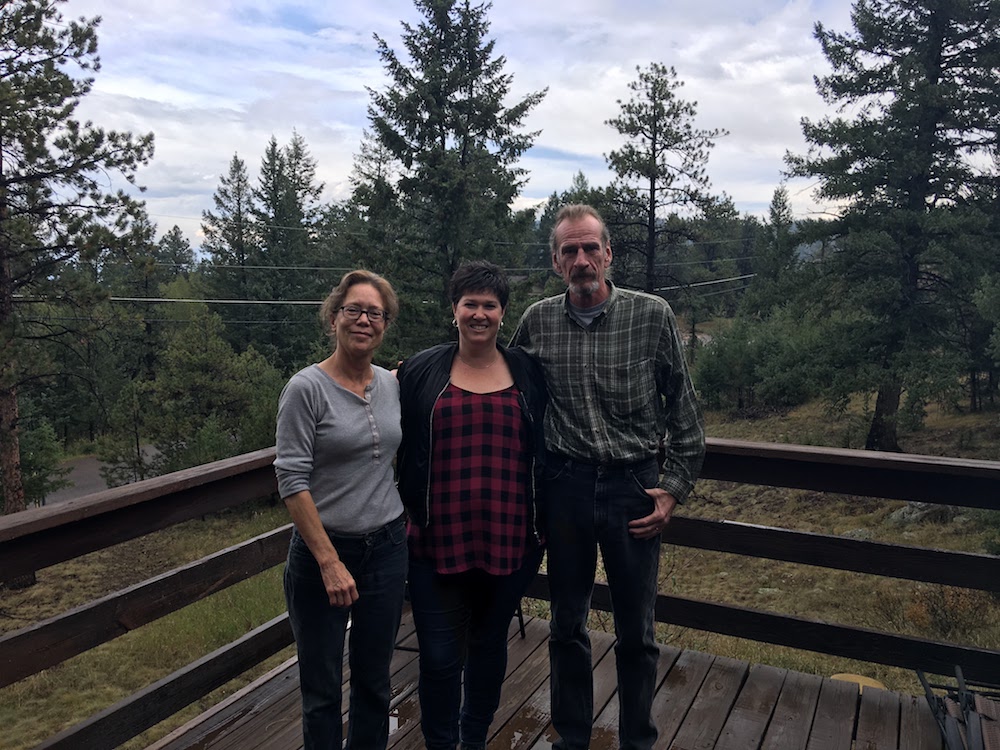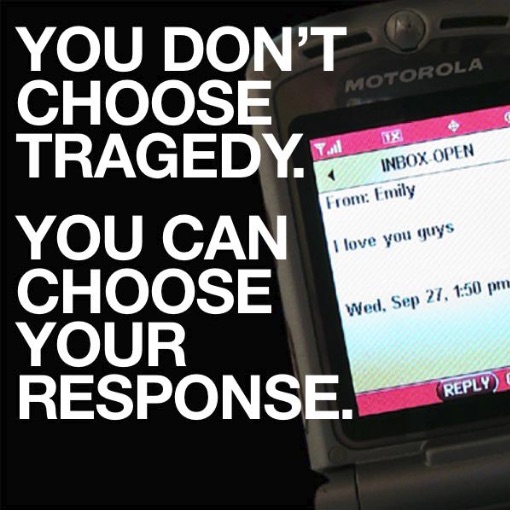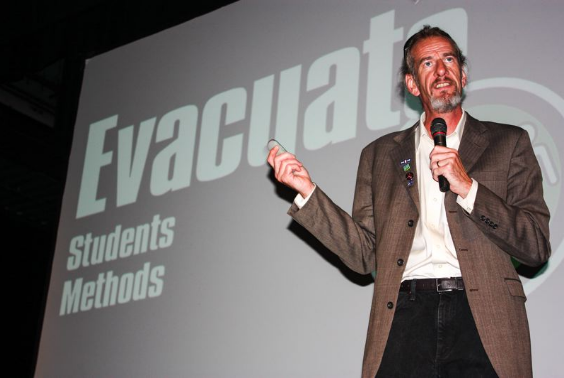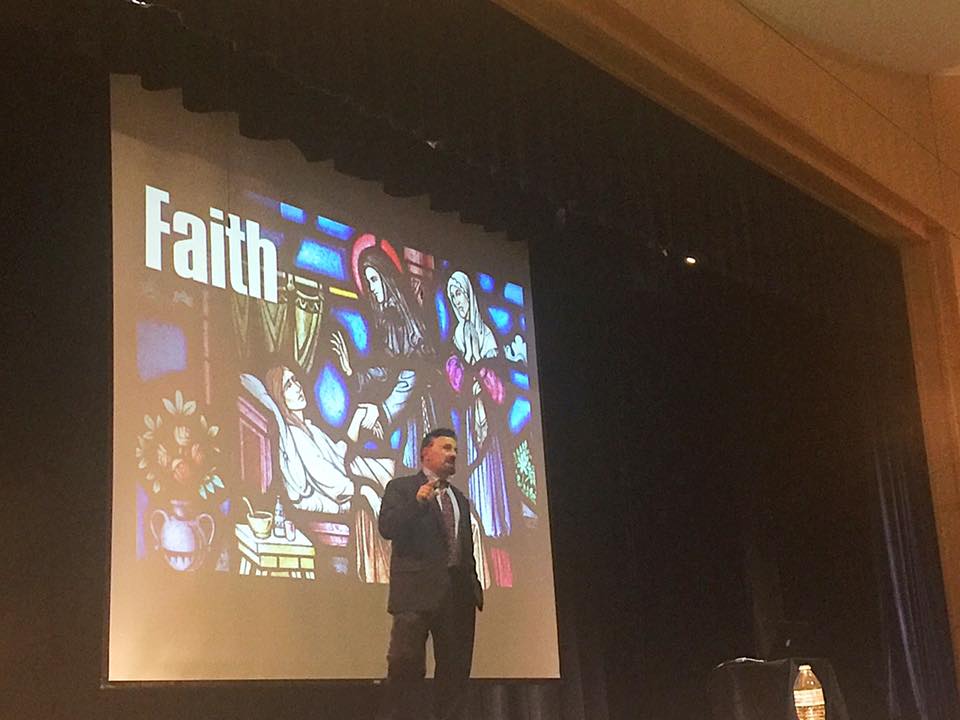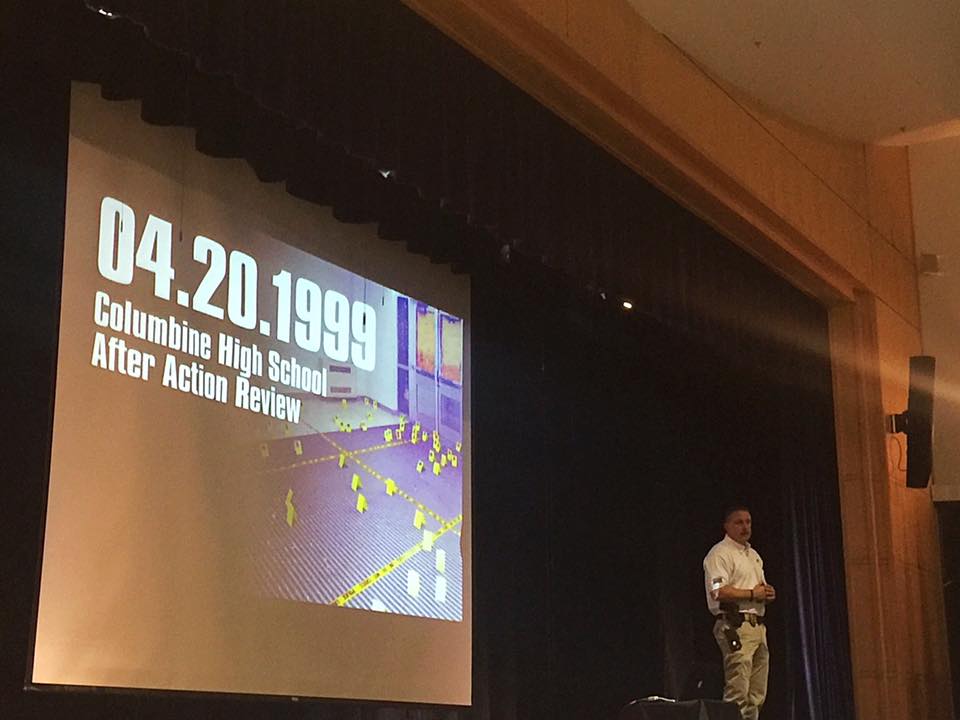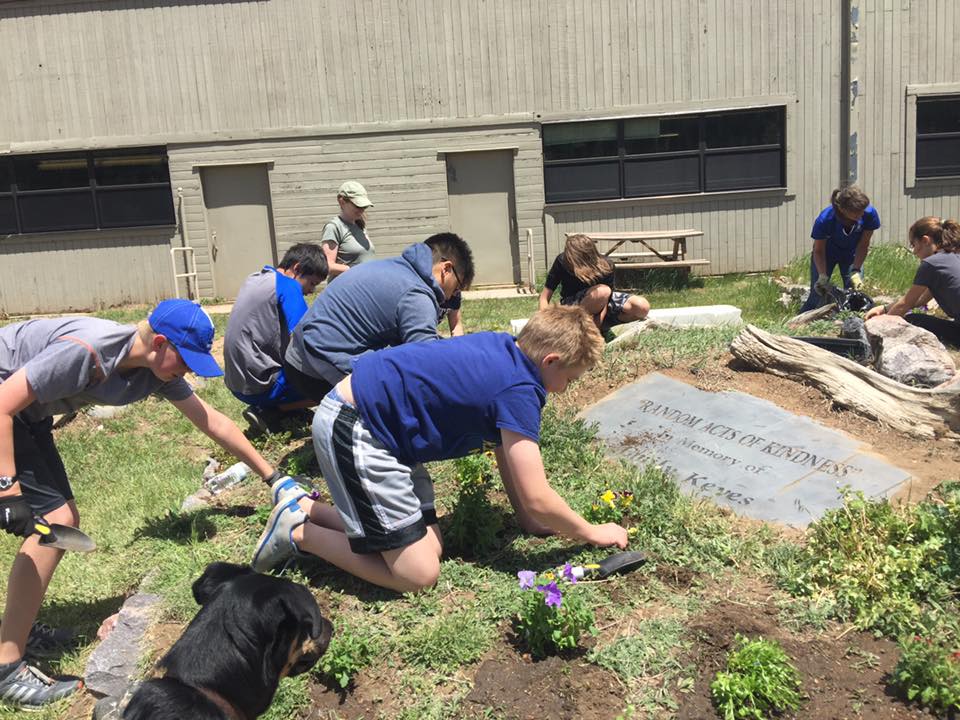Sharon Montgomery
The "I Love U Guys" Foundation
PEACE - "It does not mean to be in a place where there is no noise, trouble, or hard work. It means to be in the midst of those things and still be calm in your heart."
When I got the heads up that September was a special month for the mountain community of Bailey, Colorado, I had to ask why. Turns out it's a month of remembrance for Emily Keyes, the catalyst for the "I Love U Guys" Foundation. This, friends, is a big deal. Here's why:
"On September 27th, 2006, a gunman entered Platte Canyon High School in Bailey, Colorado, held seven girl's hostage and ultimately shot and killed Emily Keyes. During the time she was held hostage, Emily sent her parents text messages… 'I love you guys' and 'I love u guys, k?' Emily's kindness, spirit, fierce joy, and the dignity and grace that followed this tragic event define the core of the 'I Love U Guys' Foundation - The Standard Response Protocol PK-2 Manual, I love U Guys Foundation Curriculum Toolkit.
I had the opportunity to meet with Emily's parents and get a feel for the dignity and grace that followed. Although the tragedy was real and is still keenly felt, this story is about what happened AFTER the tragedy hit. And friends, this is where the community that My Mountain Town is so incredibly proud to be a part of stepped up.Emily's parents, Ellen Stoddard-Keyes and John-Michael Keyes, tapped into a perfect storm to channel their grief into a gift that keeps on giving. Because of John-Michael's background in computer coding and Ellen's background in running an ad agency, copywriting, and managing a government contract for Access Control, they had the skills and background to make a difference.
The first thing I experienced when walking up the stairs of their mountain home was Baron, a mixed-breed (German Shepherd and Rottweiler) dog wanting to jump up, nip, play, and interact. Did I mention he is roughly 75 pounds of pure awesomeness? However, Baron's antics were becoming a potential problem. Like a well-oiled machine, John-Michael and Ellen tackled the issue. While Ellen explained, John-Michael showed his genius zone and compassion as he "Put Baron to work."
A bit of showboating was necessary at first, to settle Baron down. Then the true focus work began. John-Michael kept Baron's attention, having him stay for longer and longer periods of time, in specific and purposeful spots, and had Baron stay put even when treats were dropped accidentally in front of him. It ended with Baron lying down calmly in an out-of-the-way space, his energy completely calm and focused as he did his own work, chewing on a focus toy.
I knew right then and there that there was something special to these folks.
Nobody scolded the dog. There wasn't a yelled, "Baron! No!" when he got underfoot. They didn't explain away the behavior because Baron was a puppy and just learning. Age didn't even play a part. Of course, he was old enough to understand what was expected. Of course, Baron could contribute and handle his jobs. His behavior was acknowledged and tackled, head-on. Even our audience participation was purposeful and helped the overall end-game. (Read here, folks, as "we were directed on when to get involved and when/why to stay out of the way at certain times.") Empowerment was a consistent theme, and a precursor to what I'd learn about them in their life philosophy: They help because they can.Ellen and John-Michael have the knack to assess, calm, and provide focus in an escalating situation. Whatever the situation. It's what they do. And It's these attributes, I'd say, that enabled John-Michael and Ellen to choose a proactive path when the biggest tragedy of their life happened eleven years ago. That path has exploded into helping schools, colleges, businesses and courthouses nationwide, and even into Canada and the UK.
After John-Michael and Ellen lost Emily, their thoughts turned to one question, "Can we really help?" If there was any way they could take school safety to a new level, they were determined to do it. John-Michael and Ellen rolled up their sleeves and spent the next two years educating themselves about school operating procedures through many symposiums, conferences and research. What they found was numerous communication gaps that existed, due to the lack of a common language between parents, students, educators and first responders in the event of an emergency.
"It can be challenging when you have multiple schools in a district doing different things. No one knows who is doing what," shared John-Michael.It was 2009 when John-Michael made the choice to walk away from a lucrative tech career to work full time, putting together all the information he had gleaned into a comprehensive safety program, and at the same time Ellen became the go-to-source for the foundation while John-Michael stepped in as the mouthpiece. The Standard Response Protocol (SRP) is the program that burst from the ashes of Platte Canyon High School tragedy. It rose up to fill in the gaps by giving a common language, structure, and hope to those that might experience a violent incident in their school or workplace.
Here's the kicker...it's absolutely free to those that need the program. That right there will tell you all you need to know about this couple.
When the SRP launched, the "I Love U Guys" Foundation hit the ground running. John-Michael was invited to speak at the National School Safety Conference, hosted by the Department of Justice. The SRP was incorporated into Jefferson County School District (Jeffco) first. At the end of the year, 250 schools in Colorado, and dozens across the country, had incorporated the SRP. Ellen shared that there are 7 thousand schools registered in their database, but it is estimated that the number of schools using the protocol are actually closer to 25 thousand due to responses and stories they are hearing every day from places not yet registered.
"We never lost our voices, they've only gotten louder." - Ellen Stoddard-KeyesRecently the couple learned of a story which speaks to the effectiveness of the SRP being used in schools. John-Michael shared, "I spoke to the safety and security director at Jeffco, John McDonald. They now have an entire student population who have been through this program since kindergarten. He had a parent call him to let him know that there was a lockdown at the college some of the Jeffco kids were at and they knew what to do and ended up being leaders during the lockdown at the college level."
This was really good news for John-Michael and Ellen because they had learned that kids not only need a school safety plan, they wanted one as well. When John-Michael brought his training to 800 students, teachers and police officers in Nebraska, he got some powerful feedback from the students. They explained that the grown-ups need to talk to them about what is going on. They wanted to have a plan and they wanted to know that the adults had a plan as well.
It wasn't surprising that the first resistance to the SRP came from the parents, who said that school officials were scaring the children by making them run through different scenarios, but in all actuality the kids were very pragmatic about everything, and at the end of the day, SRP gives kids a voice and has created a bridge between kids and adults by starting a dialog.
In 2012 John-Michael and Ellen picked up on another void in reunification which addresses the question, "How are students reunified with their parents after a crisis?"
"If a re-unification is botched then it can spiral out the trauma for everyone," Ellen explained. To get more information about this topic, they went to the Chief Operations Officer at Adams Twelve Five Star Schools, Pat Hamilton. Pat used to be security and had done many reunifications. He shared that the first six reunifications he worked on didn't go well, but he learned from his mistakes and refined the process.
Based on Pat's work, they introduced the Standard Re-unification Method. John-Michael advised me that the instructions online are complex, because every re-unification is unique, but it can be tailored to different circumstances. Standard Re-unification Method is to minimize the trauma for everyone involved. "With re-unification, the recovery starts as soon as the crisis begins. So when you do the reunification currently you have control over that piece of it. People are seeing the logic of this everywhere," John-Michael said.
After SRP saw irrefutable success in school districts, Operational Guidance, the SRP higher education guidelines, was adapted for higher education, community colleges specifically. Texas State University has 50 thousand students and is using Operational Guidance, while the Colorado college system has 14 colleges 35 campuses on board. Businesses followed soon after, such as 29 credit unions in Omaha, Nebraska, The Los Angeles Court System, and has the potential to be used in churches and hospitals, essentially anywhere else a crisis could happen.
In 2011 John-Michael and Ellen started the Briefings at Columbine. According to Ellen, "We were just going to do it one year. It is a symposium where we brought in speakers. We did our sixth one this year and it was our highest attendance ever. It was a series of incredible speakers. Over 300 people attended. People come from all over the country and as far as Germany and Canada." John-Michael also shared that they are currently seeing schools and districts now leaning towards threat assessment.
Ellen shared with me that the "I Love U Guys" Foundation has also given a platform to those who didn't feel like they could talk about what had happened to them during their crisis. From students who experienced firsthand, to parents who waited terrified not knowing and the first responders who felt the weight of responsibility for the lives of those that hung in the balance.
"Emily gave us a voice. We can talk about this. We found that people are more willing to talk about their experience with someone that has firsthand knowledge of the trauma and are directly affected by a school act of violence. We can talk about this and we can make a difference. That is the root of where this positive stuff started," explained Ellen.
When reminiscing about the aftermath of the Platte Canyon High School hostage situation John-Michael and Ellen recalled the overwhelming support and love that came from their community. In the beginning the residents of Bailey showed solidarity by not offering interviews to the press to show support to the families that were in shock. It was also important that the shooter was not named in the story, to give him any fame due to his heinous actions. It turned out that even the National Press was on board, and the shooter remained unnamed in the news.
After the incident at the school, the students clung to each other, trying to find a way to address their grief. This is when the contributions came pouring in from their community, to build a community center where the Platte Canyon High School students could gather to support each other. This eventually morphed into the Boys and Girls Club of Park County which has left a strong footprint on this community. "We never lost our voices, they've only gotten louder. That's because of this weird organic growth. We never had the capacity to do serious marketing outreach, we can barely keep up with the organic growth of it," said Ellen.
When I asked the couple what their community can do to help now, John-Michael shared with me, "We are working with districts and agencies across the country and Canada and we've got a National footprint. We get almost a dozen calls a month from business entities in this space who want to affiliate with us because we are everywhere and we look bigger than we are, so people think we are doing very well. Donations for our type of organization are not at the same percentages as earned income. When we go out and train we almost always bill, sometimes we don't."
It is charitable donations that continue to make the Standard Response Protocol available to everyone as well as trainings, information about school safety, Symposiums and the growth of a program that has proven effective on every level.
John-Michael and Ellen tap into their strengths to ride the storms when they come their way, whether it is with an energetic dog needing a purpose, or filling the gaps of our School Safety Plans, they answer their challenges with solutions that make this world a better place. After spending time with them, I knew that their story is in all of us, and I am empowered to do the same.
I wrote this to spread the word, and will be getting the message out in my neck of the woods, not to mention donating time and well-earned cash to the cause. The question I pose to you friends, is WHAT can you do to contribute? What are YOUR strengths? And whose life could YOU touch by stepping up to make a difference? Because if Ellen and John-Michael can help when they had no idea how far reaching their choice could go, it's not far fetched to think that WE could make a difference too.
"Yesterday is gone. Tomorrow has not yet come. We have only today. Let us begin."
-Mother Teresa.
For more information about the "I Love U Guys" Foundation, or to donate, please visit their website and Facebook page.
Thank you to the "I Love U Guys" Foundation for permission to use their photos in this article.
Comments 4
This article made me cry. Twice. Learning that our kids want to be involved in planning for emergencies, realizing they can handle the worst that life can dish out and rise above...it's awe-inspiring. You don't have to be a school to adopt the Standard Response Protocol either: it works for churches and businesses too. Thank you Sharon for a wonderful article, and to John-Michael and Ellen for sharing their time and home!
You are so welcome! Agreed! There are so many ways to get behind this cause with money and time contributions.
But truly, it ultimately benefits the community. Your community. My community. No matter where a person lives.
A simple first step is to go to the site, find out how to adapt it to your own work/school/business situation, and get in touch with them to brainstorm.
Kids, employees, co-workers, family members and congregations all want to know that there is a plan. Now we know there are options.
And leave some cash so they can keep doing what they do and train those first responders!

